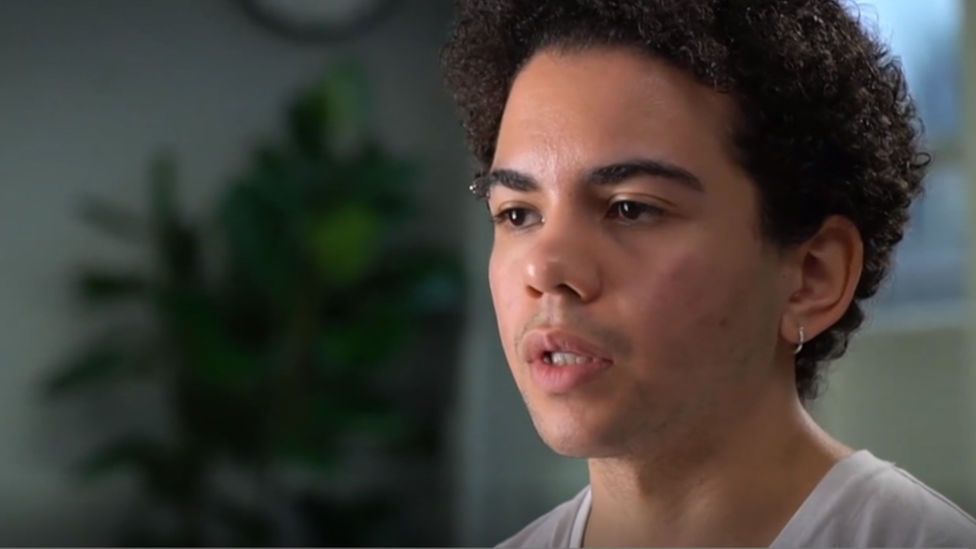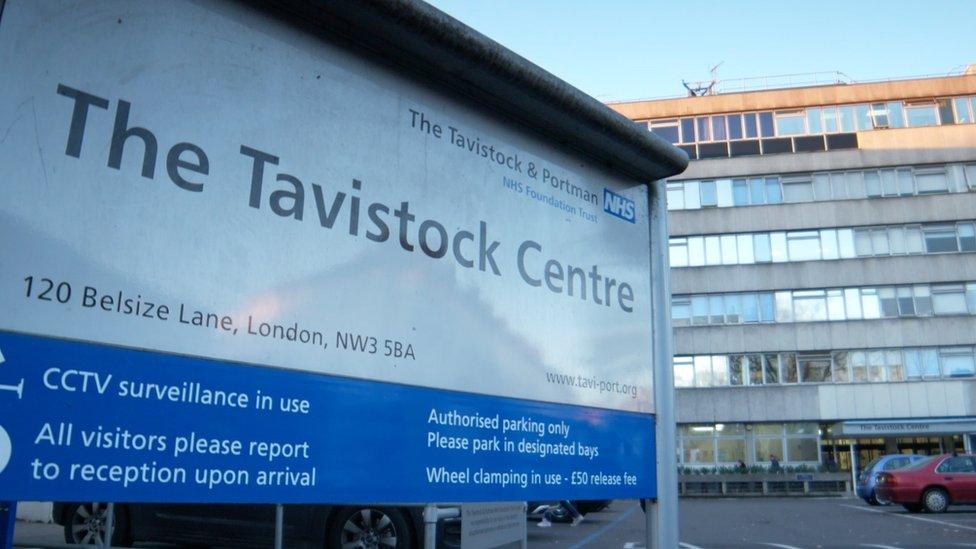Keira Bell: Puberty blockers give children options, Trust says
- Published

Keira Bell said the gender identity clinic should have challenged her more
The Court of Appeal is considering whether under-16s can give informed consent to medical treatment that delays the onset of puberty.
The appeal is brought by the Tavistock and Portman NHS Foundation Trust.
It says puberty blockers give children distressed by their birth sex time to consider "options".
But a representative for Keira Bell, who brought the original case, says children cannot understand all of the treatment's implications.
Judgement is reserved for a later date.
The two-day appeal also includes submissions from LGBT and other interested groups.
In December 2020, the High Court ruled that under-16s were unlikely to be able to give informed consent to what it described as "experimental" treatment, which is sometimes used to pause puberty in children experiencing gender dysphoria.
Keira Bell, one of the claimants in the case, started taking puberty blockers at the age of 16 after being referred to the Tavistock and Portman Trust, which runs the UK's only Gender Identity Development Service (Gids).

Now in her mid-20s, says she regrets her decision to transition to a male, and says the clinic should have challenged her more.
Speaking outside the Appeal Court on Wednesday morning, she said: "I'm always hopeful, but the result could go any way."
The Tavistock has argued throughout that it provides safe treatment and puts the best interests of young people and their families first.
On Wednesday, Fenella Moss QC, representing the Trust, argued that the High Court's original judgement was wrong to find the use of puberty blockers for gender dysphoria was "experimental".
Ms Morris said that puberty blockers are deemed fully reversible in international guidelines, and that "not providing treatment means that the child remains in a position of distress and difficulties in making choices about what to do next".
She argued that it is not inevitable that a young person would continue on to taking cross-sex hormones - which the NHS advises cause some irreversible changes, external - after puberty blockers.
Children and young people are told about effects on their fertility that may be caused by later stages of transition, she added.
"There is no suggestion anywhere that this is one pathway... there is no shying away from explaining to children and young people what the possibilities are."

The trust that runs the gender identity clinic is appealing the decision
Jeremy Hyam QC, representing Ms Bell and Mrs A, the other claimant, argued that the appeal should fail as it did not find any "material errors" in the original ruling.
In written arguments, he said: "The need for a child to understand, retain and weigh up the salient facts is all the more important because, unlike life-saving cancer treatment, there is much uncertainty as to what the benefits of puberty blockers actually are."
In court on Wednesday, he added: "Right at the heart of what the court was concerned about was how can it be said that children of 10, 11, 12 have any proper conception of what sexual function is?"
Nine organisations or individuals - including human rights group Liberty and The Endocrine Society - have given evidence in the appeal.
In a separate case in March, external, the Family Division of the High Court ruled that parents could give consent for under-16s to access puberty blockers.
But it said it may be that "additional safeguards" should be put in place, such as the requirement for an independent second opinion.
What are puberty blockers?
Puberty blockers are drugs that suppress the release of hormones produced in much bigger quantities during puberty.
They are sometimes used to treat gender dysphoria, which the NHS describes as "a sense of unease that a person may have because of a mismatch between their biological sex and their gender identity".
Gids says puberty blockers allow a young person "time to consider their options and to continue to explore their developing gender identity before making decisions about irreversible forms of treatment".
It advises that while the effects are physically reversible if treatment is stopped, the full psychological effects - or whether it alters the course of adolescent brain development - aren't known.
The NHS says "little is known" about the long term side effects, external in young people with gender dysphoria, including whether the treatment affects the development of the teenage brain or children's bones.
Puberty blockers are also used to treat conditions which cause premature puberty in much younger children.


This is the most contentious of areas.
Partly because opinions will vary hugely on the age at which a child can understand the impact of a decision made in their early teens on the life they will lead as an adult.
And partly because at its heart lie the futures of young people struggling with their gender identity, who may already feel marginalised, misunderstood and harmed by delays in treatment.
The Court of Appeal hearing has so far revolved around two key areas.
Firstly, whether under-16's can truly consent to puberty blockers when their feelings about, for instance, their fertility may change substantially in the next decade.
Secondly, whether that treatment is experimental. The High Court concluded it was. The Tavistock disagrees, throughout it has pointed to prescription of the drugs by doctors going back more than twenty years.
It will be for the Appeal Court to settle these arguments, but the case has already underlined the importance of more research in this complex area.

In the December ruling, external, Dame Victoria Sharp, sitting with Lord Justice Lewis and Mrs Justice Lieven, said: "It is doubtful that a child aged 14 or 15 could understand and weigh the long-term risks and consequences of the administration of puberty blockers."
The judges added it was "highly unlikely" that children aged 13 and under would have the capacity to give consent.
Mermaids, which provides services for young people and their families who struggle with their gender identity, says that decision, "put a further strain on the already marginalised transgender and non-binary community and their families".
"We believe strongly that trans and non-binary children should have the same rights over their healthcare decisions as anyone else, in line with their evolving understanding," the charity said in a statement.
Transgender Trend, an organisation made up of parents, professionals and academics who are "concerned about the current trend to diagnose children as transgender," has submitted evidence to the hearing.
Founder Stephanie Davies-Arai said: "Children do not have the maturity or life experience to give informed consent to medical interventions with such devastating long-term consequences and we hope and expect that the Appeal Court will uphold the High Court's judgement".
Related topics
- Published12 October 2021
